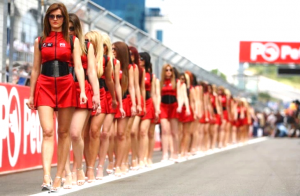Blog post by Aiden Graham
Without over generalisation- we can consider the response to the changes in terms of two camps.Across the sports industry, women are employed in roles intended to glamourize major events. Cycling has its Podium Girls, Boxing its Ring Girls, and Formula One (F1) it’s Grid girls. That was- until recently, when prior to the 2018 racing season- F1’s new owners, Liberty Media announced that they are calling time on the Grid Girl. A decision which has proven highly controversial.
On the one hand, we have a camp comprised of figures from within F1, a number of fans and members of the general public who have praised the decision as ending a demeaning, objectifying and outdated practice which has no place in the age of gender equality.

On the other, we have a camp comprised of the majority of fans and the grid girls themselves who have responded with a mixture of frustration, outrage and regret. This camp views the decision to remove grid girls as cow-towing to a P.C. minority, and ignoring the Grid Girls themselves who found ‘pride’ and ‘joy’ in their work, revelling in the luxury and status that came from being part of the multi-million-dollar world of F1.
With a BBC poll finding 60% of F1 fan’s opposing the ban on Grid girls, and a number of petitions levelled against the changes- it is the latter position which seems most popular.
If there is a good reason to keep Grid Girls- it won’t be found in the role they play in hosting an F1 event.
Grid Girls contribute ostensibly little towards an F1 Grand Prix. Their main responsibilities include promoting race sponsors, holding umbrellas, and displaying signs to help drivers find their cars. Many of these tasks appear surplus to requirements: do drivers really need help finding their car amongst the 21 other distinctive vehicles on the grid? Regardless- there is no good reason as to why these tasks specifically require a high heeled, bikini-clad, female workforce.
If not for their function- then it must be form which explains the presence of Grid Girls. The only fathomable reason why they are present- is to excite and entice fans with their feminine good-looks. They stand as silently, smiling, sex-symbols in a testosterone fuelled, world of big money and fast cars. This is something we can do without. Employing women simply to parade around a race track- to be ogled at amounts to little more than a needless eroticisation, a crass form of entertainment which cheapens the integrity of the sporting competition.
Rather than simply dismissing the end of Grid Girls as a P.C, ‘snowflake’ conspiracy, we should look at these changes in line with their intention to promote a more admirable i mage of women in sports.
mage of women in sports.
There are enough images of women in the world of sport handing over medals rather than receiving them. There must be a harmful effect on women and girls who see events which accept their presence, but not their participation; which praise their figures over their fight, and welcome their style, not their skill. When we combine this with the findings of Messner and Duncan- who have highlighted the second-rate image of female athletes, who continue to receive less air time, lower wages, and less media enthusiasm– getting rid of Grid Girls becomes all the more necessary to pave the way toward a more equitable image of women in a sporting context- even if only as a gesture to that end.
‘There must be a harmful effect on women and girls who see events which accept their presence, but not their participation…’
I do have reservations- and deep sympathy for the Grid Girls who have lost employment. These concerns relate to a complex debate- that requires finding the balance between the rights of individual women to make their own choices, and the rights of other women to cultivate an ideal of womanhood that they can project with pride for both themselves and their daughters. As much as grid girls enjoyed their role, we have to acknowledge that many women (and men) felt it undermined the fight for gender equality. Considering this, I feel it is far better to support the changes for their potential benefits to women all over the world; than to condemn them for the loss suffered by the few women employed as Grid Girls.
Must we ban grid girls? on the whole, this feels like a step in the right direction. Whilst I don’t believe the Grid Girls were the biggest barriers to equality of the sexes, they served no real purpose. My only concern is for the Grid Girls- these women should not be victim to what has been presented as their own emancipation. I hope Liberty Media support them in their search for new careers and that fans quickly realise the most important aspect of F1- the Grand Prix- will not be affected in the slightest.

Let’s get back to the racing…

